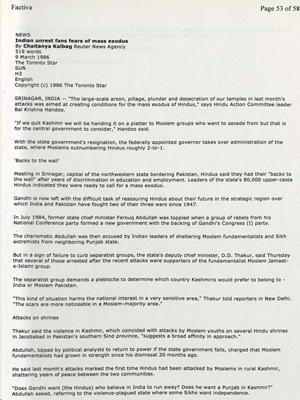Indian unrest fans fears of mass exodus
[Reuters]
Published date: 9th Mar 1987
Reuter News Agency
9 March 1986
The Toronto Star
Sun
H3
English
Copyright (c) 1986 The Toronto Star
SRINAGAR, INDIA — “The large-scale arson, pillage, plunder and desecration of our temples in last month’s attacks was aimed at creating conditions for the mass exodus of Hindus,” says Hindu Action Committee leader Bal Krishna Handoo.
“If we quit Kashmir we will be handing it on a platter to Moslem groups who want to secede from but that is for the central government to consider,” Handoo said.
With the state government’s resignation, the federally appointed governor takes over administration of the state, where Moslems outnumbering Hindus roughly 2-to-1.
‘Backs to the wall’
Meeting in Srinagar, capital of the northwestern state bordering Pakistan, Hindus said they had their “backs to the wall” after years of discrimination in education and employment. Leaders of the state’s 80,000 upper-caste Hindus indicated they were ready to call for a mass exodus.
Gandhi is now left with the difficult task of reassuring Hindus about their future in the strategic region over which India and Pakistan have fought two of their three wars since 1947.
In July 1984, former state chief minister Farouq Abdullah was toppled when a group of rebels from his National Conference party formed a new government with the backing of Gandhi’s Congress (I) party.
The charismatic Abdullah was then accused by Indian leaders of sheltering Moslem fundamentalists and Sikh extremists from neighboring Punjab state.
But in a sign of failure to curb separatist groups, the state’s deputy chief minister, D.D. Thakur, said Thursday that several of those arrested after the recent attacks were supporters of the fundamentalist Moslem Jamaat e-lslami group.
The separatist group demands a plebiscite to determine which country Kashmiris would prefer to belong to – India or Moslem Pakistan.
“This kind of situation harms the national interest in a very sensitive area,” Thakur told reporters in New Delhi. “The scars are more noticeable in a Moslem-majority area.”
Attacks on shrines
Thakur said the violence in Kashmir, which coincided with attacks by Moslem youths on several Hindu shrines in Jacobabad in Pakistan’s southern Sind province, “suggests a broad affinity in approach.”
Abdullah, tipped by political analysts to return to power if the state government falls, charged that Moslem fundamentalists had grown in strength since his dismissal 20 months ago.
He said last month’s attacks marked the first time Hindus had been attacked by Moslems in rural Kashmir, shattering years of peace between the two communities.
“Does Gandhi want (the Hindus) who believe in India to run away? Does he want a Punjab in Kashmir?” Abdullah asked, referring to the violence-plagued state where some Sikhs want independence.
As the politicians debated the fate of the government in Kashmir, houseboats and hotels stood empty as tourists fled several days of curfews clamped after the unrest.
The tension was illustrated by a sign painted in elegant Urdu calligraphy on the rutted highway leading to the village of Lok Bhawan, where four Hindu temples were destroyed last month.
It said simply: “Pakistan Zindabad” (Long Live Pakistan).






